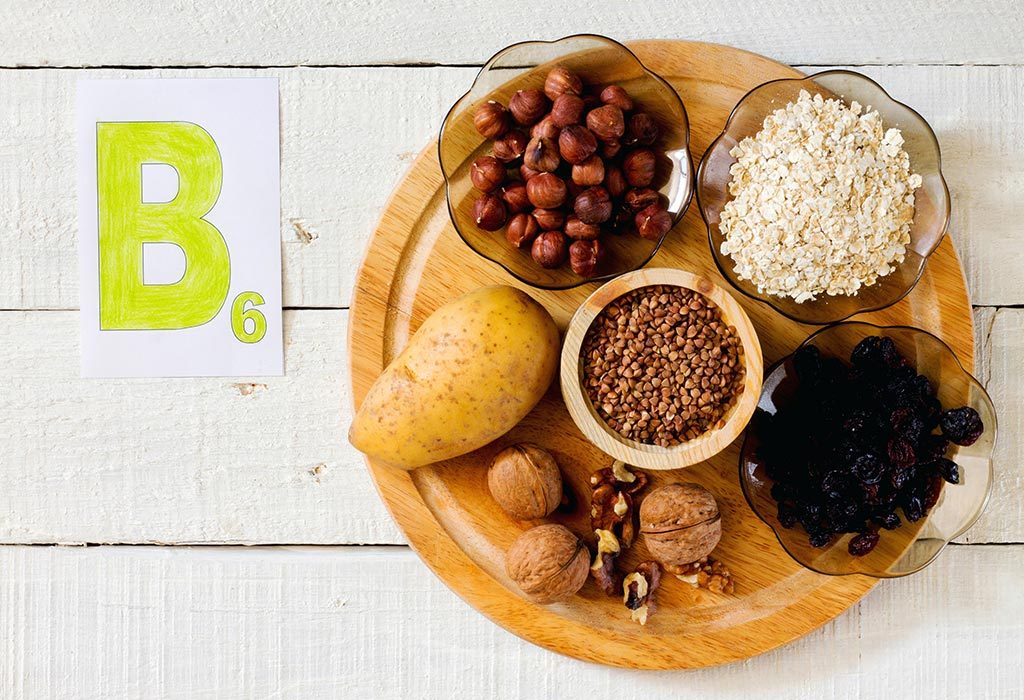In this Article
Vitamins and minerals are vital for your child’s well-being. Out of the thirteen vitamins, eight constitute a group called the vitamin B complex which is water-soluble nutrients. Together they offer numerous health benefits which make it imperative to ensure that your kid gets a regular supply of them during his formative years.
Different Types of Vitamin B and Their Benefits for Kids
The family of vitamin B complex for kids mainly include eight vitamins, namely:
1. Vitamin B1 (thiamine)
- It helps foster healthy nerves and muscles in kids.
- It is required by a kid’s body to break down carbohydrates into energy.
2. Vitamin B2 (riboflavin)
- It helps in boosting the production of red blood cells in your child’s body.
- It helps in digestion and energy production.
- It activates vitamin B6 and produces vitamin B3.
3. Vitamin B3 (niacinamide or niacin)
- It is involved in the process of converting fats and carbohydrates into energy.
- It is useful for the normal functioning of the nervous system and digestive system in kids.
- It also helps in promoting healthy skin in children.
4. Vitamin B5 (pantothenic acid)
- Children need it to metabolise fats and carbohydrates
- It helps in the productions of red blood cells and adrenal hormones in kids.
5. Vitamin B6 (pyridoxine)
- It is essential for the normal brain development in children.
- It is vital for kids as it helps the release of brain chemicals like serotonin which regulates moods and norepinephrine which helps in coping with stress.
- It assists in maintaining the proper running of the nervous system and keeping the immune system of children healthy.

6. Vitamin B7 (biotin)
- It is necessary for the metabolism of cholesterol, certain amino acids and fatty acids in kids.
- It stimulates healthy skin, hair, and nails in children.
7. Vitamin B9 (folic acid)
- It plays a pivotal part in the formation of red blood cells in children.
- It is valuable for their healthy cell growth and DNA production.
8. Vitamin B12 (cyanocobalamin)
- It may actively contribute to the creation of red blood cells in kids.
- It supports healthy maintenance of nervous system and brain in kids.
Vitamin B Recommendation for Children
Children of all ages may get their recommended essential daily requirements through a well-balanced, nutritious diet.
1. For Children Who are 4 and Above
The dosage for a child who is 4 and above:
- Pantothenic acid- 10 mg per day
- Thiamine- 1.5 mg per day
- Niacin- 20 mg per day
- Riboflavin- 1.7 mg per day
- Pyridoxine- 2 mg per day
- Folic acid- 400 mcg per day
- Biotin- 300 mcg per day
- Vitamin B12- 6 mcg per day
2. For Children Under 4 Years
Recommended daily allowances (RDA) for children who are younger than 4:
- Folic acid- 100/200 mcg per day
- Thiamine- 0.5/0.7 mg per day
- Niacin- 8/9 mg per day
- Riboflavin- 0.6/0.8 mg per day
- Pantothenic acid- 3/5 mg per day
- Biotin- 50/150 mcg per day
- Pyridoxine- 0.1/ 0.5 mg per day
- Vitamin B12- 2/3 mcg per day
Food Sources of Vitamin B Complex
Some of the important food sources of vitamin B complex are:
- Fruits like watermelon, banana, and grapefruit
- Green leafy vegetables
- Dairy products
- Fish and seafood
- Eggs
- Meat
- Fortified cereals and bread
- Legumes like peas, beans
- Potatoes
- Nuts
- Whole grains
- Yeast
- Liver
- Poultry
Vitamin B Deficiency Symptoms in Children
Following are the symptoms of vitamin B deficiency in children:
- Insufficient levels can cause anxiety, irritability, and fatigue in kids.
- Kids can suffer from beriberi and in some cases, even epilepsy.
- Deficiency of riboflavin can trigger cheilosis (mouth dryness), glossitis (tongue soreness), light sensitivity, skin rashes, and eye pain in children.
- It may induce diarrhoea, dermatitis, weakness, nausea and abdominal pain in kids. Its deficiency can also cause depression, anxiety, and poor concentration in kids.
- It can lead to fatigue and gastrointestinal disorders in kids.
- Vitamin B Deficiency can lead to neonatal defects during pregnancy.
- Inadequate levels can cause lesions and abnormal skin rashes in kids.
- Deficiency of vitamin B in kids can impact their nervous system leading to symptoms like tingling sensation, and numbness.
- Deficiency of vitamin B in kids can result in megaloblastic anaemia and developmental delays.
- It can lead to hindered growth, poor blood formation, and weak muscles.
Are Vitamin Supplements Recommended to a Child
In case the recommended dose of vitamin B is not met through a child’s daily diet, it is desirable to take vitamin supplements particularly in the case of vegan kids. However, it is important to refer a doctor before consuming any vitamin supplements for the proper dosage. It may be best to give vitamin supplements to kids in the form of drops than tablets for better absorption.
Kid-friendly Vitamin B Snack Ideas
Believe it or not but there are a number of ways in which you can help your child get his daily dose of this vitamin. Some snack ideas for this vital nutrient could be:
- Make tasty rolls stuffed with green vegetables or meat and add your kid’s favourite sauce for extra flavour.
- You can make a yummy chicken sandwich with tomatoes and lettuce.
- You can offer hard boiled eggs as a snack to your kid.
- You can prepare a dip from pureed spinach and serve with bite-size pieces of raw vegetables like carrots.
Nutrition for kids is important, and parents often end up giving the wrong food leading to an imbalanced diet. Using the above-mentioned food sources, it should be easy for you to prevent the diseases caused by lack of vitamin B.










